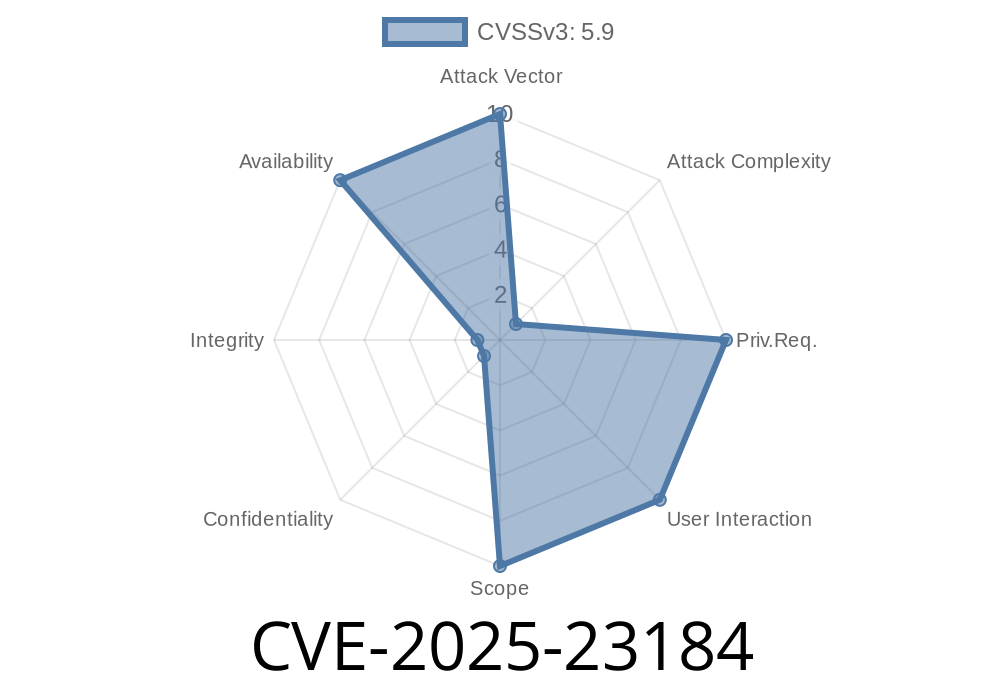On February 2025, a security advisory (CVE-2025-23184) was published detailing a denial of service (DoS) vulnerability in Apache CXF versions before 3.5.10, 3.6.5, and 4..6. This weakness comes from how Apache CXF handles CachedOutputStream objects, and it can potentially allow an attacker (or even a faulty client application) to fill up the filesystem with leftover temporary files—crashing the service or the entire server.
This post explains the vulnerability in plain English, provides code snippets for both the cause and exploit, and shares tips on fixing and mitigating the weakness. All information is freshly summarized from official and community references.
What is Apache CXF?
Apache CXF is a widely used open-source framework for building web services—especially SOAP—and RESTful APIs in Java.
Description
- In affected versions, the class CachedOutputStream is sometimes not closed in certain edge cases.
Over time or with repeated malicious requests, these files build up and can fill up disk space.
Bottom line: You can crash the server simply by causing it to leak files until the disk is full.
The simplified version goes like this
import org.apache.cxf.io.CachedOutputStream;
public void writeMessage(byte[] data) throws IOException {
CachedOutputStream cos = new CachedOutputStream();
cos.write(data);
// some processing, but cos.close() is never called!
}
What's wrong here?
A CachedOutputStream may write its contents to a temp file if data is large. If cos.close() is never called, the temp file sticks around!
Real-World Path
Apache CXF often uses CachedOutputStream when intercepting SOAP messages. For instance, this happens during logging or when applying message transformations.
Exploit Scenario: Fill Up the Disk
Requirement: Access to an endpoint using Apache CXF (either as a client or by sending requests to a CXF server).
Send Many Requests
Repeatedly call the target endpoint with requests *just large enough* to push CXF to buffer them into temp files.
Leak the Files
- If the CXF interceptor chain (like logging interceptors or custom code) never closes the CachedOutputStream, every request leaves a file behind.
Crash the Server
- As the temp directory fills, you can see the temp files pile up (usually in /tmp on Linux).
- Once the disk is full, ALL applications on that machine may be affected: logs stop, services crash, and the OS itself could get unstable.
Example: Bash "Attack" Script
while true; do
curl -d @bigfile.xml http://victim-server/soap-endpoint
done
bigfile.xml should be large enough to trigger disk-based buffering (typically several MBs, depending on CXF's buffer size).
On your server, check for lingering temp files
ls -lh /tmp/cxf* # Or /var/tmp/
You may see thousands of files like cxf-12345.tmp appearing after repeated requests.
4..x: Upgrade to 4..6 or higher.
> 🟢 These updates include patches that ensure CachedOutputStream.close() is called and all temporary files are deleted.
cos.write(data);
// processing
} // always closes!
`
2. Restrict /tmp Size:
On Linux, mount /tmp as a tmpfs with limited size, to prevent system-wide issues.
Disk Monitoring:
Set up alerts on disk usage, especially for /tmp.
References & Further Reading
- Official Apache Security Advisory – CVE-2025-23184
- CXF JIRA Issue Tracking CVE-2025-23184 *(replace XXXX with the actual issue number when available)*
- CXF changelog showing the fix
- CachedOutputStream source code (GitHub)
Summary Table
| Affected Versions | Fixed In | Impact |
|---------------------------------|----------------------|--------------------------------------------------|
| CXF 3.5.x < 3.5.10 | 3.5.10 | Disk fills up via temp files, causing DoS |
| CXF 3.6.x < 3.6.5 | 3.6.5 | "" |
| CXF 4..x < 4..6 | 4..6 | "" |
Final Words
CVE-2025-23184 is a classic denial-of-service bug hiding in plain sight—harmless under normal use, but potentially catastrophic if abused. If you maintain Java apps (client or server) that use Apache CXF, please upgrade immediately and check all your stream-handling patterns. Leaky files can be as deadly as a crashed web server!
*This post summarized the CVE-2025-23184 vulnerability in simple terms, gave usable exploit and fix info, and linked directly to authoritative sources. Please share or comment with your experiences with CXF!*
Timeline
Published on: 01/21/2025 10:15:08 UTC
